TRAVEL INFORMATION
The Lufthansa group has agreed to sponsor our conference and will be offering discounts for flights to Larnaca or Paphos
Special Lufthansa Group airlines fares
The Lufthansa Group airlines bring people together – every day, all around the world. The global route network of Austrian Airlines, Lufthansa, SWISS, Brussels Airlines and Eurowings offers optimal connection and combination options, so you will benefit from quick and direct flights to the event.
Click on: https://www.lufthansa.com/content/lh/markets/cy/en/event/scecr-2025-jun.html and the discounted rates will be displayed.
NB: Please enable pop-ups permanently in your browser while booking, otherwise the window in the booking platform will not open.
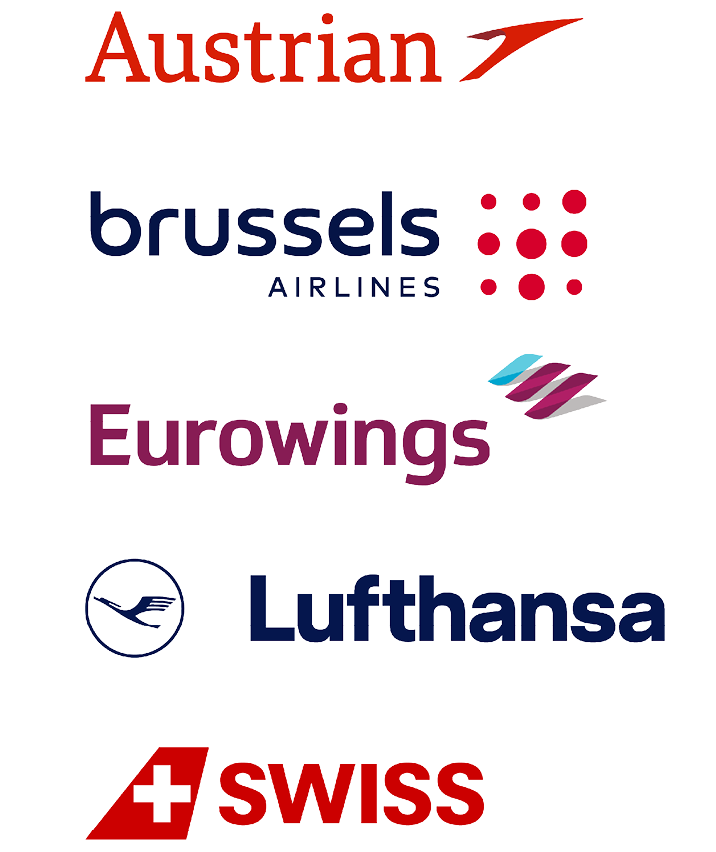
Geography
Cyprus is the third largest island in the Mediterranean, after Sicily and Sardinia, with an area of 9.251 sq. kms (3.572 sq. miles).
It is situated at the north-eastern corner of the Mediterranean, at a distance of 300 km north of Egypt. The Greek island of Rhodes lies 360 km to the north-west.
Cyprus’ coastal line is indented and rocky in the north with long sandy beaches in the south. The north coastal plain, covered with olive and carob trees, is backed by the steep and narrow Pentadaktylos mountain range of limestone, rising to a height of 1.042 m. In the south, the extensive mountain massif of Troodos, covered with pine, dwarf oak, cypress and cedar, culminates in the peak of Mount Olympus, 1.953 m. above sea level. Between the Troodos range and the Pentadaktylos mountain range lies the fertile plain of Messaoria. Arable land constitutes 46.8 per cent of the total area of the island. There are no rivers, only torrents which flow after heavy rain.

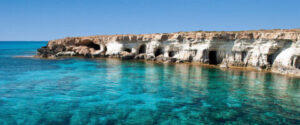

Demography
The population of the Republic of Cyprus is 952.100 (2012) of whom 681.000 belong to the Greek Cypriot community, (71,5%), 90.100 (9,5%) to the Turkish Cypriot community (estimate) and 181.000 (19,0%) are foreign citizens residing in Cyprus. The language of the Greek Cypriot community is Greek and the community adheres predominantly to the Autocephalous Greek Orthodox Church of Cyprus. The language of the Turkish Cypriot community is Turkish and the members of the community are Sunni Muslims.
History
The history of Cyprus is one of the oldest recorded in the world and its historical significance is disproportionate to its small size. The first signs of civilisation date to the ninth millennium B.C. The earliest known foreign settlements on the island were mainly of Phoenicians and Greeks, with Phoenician culture dominating the island’s eastern and southern parts. As a strategic location in the Middle East, it was subsequently occupied by several major powers, including the empires of the Assyrians, Egyptians, and Persians, from whom the island was seized in 333 BC by Alexander the Great and at which point Greek culture began to dominate. Subsequent rule by Ptolemaic Egypt, the Roman Empire, the Byzantines, Arab caliphates for a short period, the French Luisignan dynasty, and the Venetians, was followed by over three centuries of Ottoman control. Cyprus was placed under British administration in 1878 until it was granted independence in 1960.
Cyprus occupies an important role in Greek mythology being the birthplace of Aphrodite and Adonis, and home to King Cinyras, Teucer and Pygmalion.
The island figures prominently in the early history of Christianity, being the first province of Rome to be ruled by a Christian governor in the first century and providing a backdrop for stories in the New Testament.
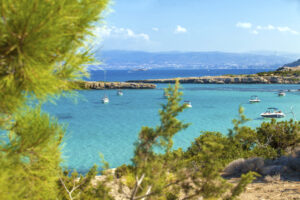
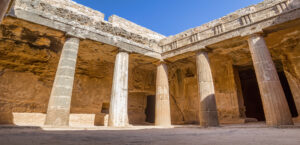
Climate
Cyprus has a Mediterranean climate: hot, dry summers from June to September and mild, wet winters from November to March, which are separated by short Autumn and Spring seasons. Sunshine is abundant during the whole year, particularly from April to September when the daily average exceeds eleven hours. Winds are on the whole light to moderate. Gales are very infrequent and heavy storms rare.
Snow hardly falls in the lowlands and on the northern range, but is a frequent feature, every winter on ground above 1.000 metres in the Troodos range. During the coldest months it lies in considerable depth for several weeks, attracting skiers.
Food and Drink
The food of Cyprus reflects the rich and turbulent history of the island and its indelible Greek culture. You will find tastes influenced by the Middle East, Asia Minor and the Venetians, all using fresh local ingredients, herbs and spices and olive oil. The Mediterranean diet, with its grains and pulses, sun-ripened fresh fruit and vegetables, high-protein fish, lean meat and poultry and wine, is a healthy option.
Cyprus has a long tradition in winemaking that goes back over 4,000 years. In ancient times wine was a major source of wealth for the island. The island supplied the Pharaohs of Egypt and Cyprus wines were in great demand amongst the ancient Greeks and Romans.
Commandaria is acknowledged to be the oldest wine in the world and was probably the first to be given an ‘Appellation d’Origin’(label of geographical origin). Legend says that Commandaria was originally made for Richard the Lionheart and the Crusaders. The dessert wine, which has a taste like sweet sherry, has been made using the same method for hundreds of years. The grapes are picked late, dried in the sun to enhance their sugar content and then pressed. The run-off is collected and fermented in tanks or in huge earthen ware jars. The sweet wine of Cyprus became known throughout Europe under the name Commandaria depicting its geographical origin “Commandarie” which was the name given to the land owned by the Knights Templar and later the Knights of St. John.
Paphos, a city rich in history, is a gem of Western Cyprus. The city’s existence can be traced back to the Neolithic period, claim archaeologists. Believed to be the birthplace of Greek Goddess of love and beauty, Aphrodite, Paphos proudly boasts the remains of villas, palaces, theatres, fortresses and tombs that belong to Classical, Hellenistic and Roman periods.
Such exceptional architectural and historic value is an ornament to the city that is included in UNESCO’s list of world heritage as a natural and cultural treasure. Paphos, roughly divided into Old Paphos and New Paphos, is also famous for its sun-kissed beaches. Paphos was valued as a major port and the capital of Cyprus during Roman times. Later when the British colonized the island, the city started losing its value especially after Nicosia gained importance.
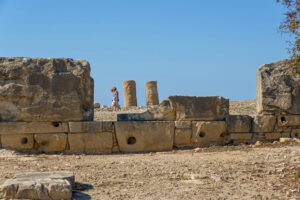
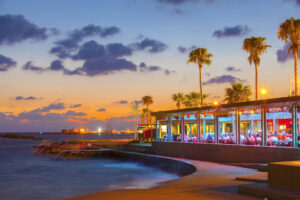
- Paphos is a small charming harbor town.
- Geographically located in the west part of the island, with the population of 52.800 people.
- Pafos is entwined with Greek mythology, and the legendary birth of Afrodite on her shores brought fame and worshippers there to follow the cult of the Goddess.
- This part of the island possesses all the elements of a perfect holiday location, conference meetings, dining, shopping and nightlife; as the choices are too many to suit each one’s preferences.
Airports
Cyprus is served by two International Airports; Larnaca International Airport, (LCA) and Paphos International Airport, (PFO). More than 50 International Airlines connect Cyprus to the whole world; for more details regarding flights to/from Cyprus, please visit the official website of both airports at www.hermesairports.com. Furthermore, domestic communication between both airports and all the major cities on the island is very quick and easy via an extensive highway system.
- Larnaca International Airport (LCA) is the main airport used by many airlines with multiple routes every week.
- Paphos International Airport (PFO) has fewer connections but serves as a hub for some low-cost airlines like EasyJet and Ryanair.
For a hassle-free experience, conference attendees are advised to use only these two airports. Please be aware that a third airport, Ercan Airport is situated in the Turkish-Occupied North part of Cyprus, and it is not a recognized port of entry into the Republic of Cyprus.
Please note that participants have the following options for their transfers from /to the airport:
Public Transportation
Please note that Cyprus has a comprehensive public bus network, with extensive inner-city routes and also major city and airport connections. You can find more information at Cyprusbybus.com. If you require specific information, please click here and select your desired city.
Larnaca Airport to Venue
Please note that currently, there is no direct bus service from Larnaca Airport to Paphos. However, you may follow the next steps:
- Step 1: From Larnaca Airport use the Limassol Airport Express coaches in order to reach Limassol city (last bus stop “Saint George Havouzas” – shuttle bus stop). Please visit their webpage for more information and timetable: www.limassolairportexpress.eu.
- Step 2: Afterwards, use the Intercity Buses (green buses) to get to Paphos city (first bus stop “Pervola – Karavela”). Kindly note that intercity bus service does not operate frequently. Please visit their webpage for more information and drop off points: www.intercity-buses.com.
- Step 3: Use public bus to reach Harbour (Main Station). Afterwards, use the Paphos public buses to reach the hotel venue. Please visit their webpage at: www.pafosbuses.com for routes and timetables.
Paphos Airport to Venue
- Use the public bus route 612 from Paphos Airport to reach Kato Paphos Station.
Please visit www.pafosbuses.com for more information and the timetable.
Private Taxi Transfers
Arrange for transfers by taxi through the conference coordinator, EasyConferences. These transfers are bookable online through www.easyconferences.org. These transfers can be private (max 3 persons) or shared, are inclusive of meet and assist, and the service is guaranteed.
Note: There will be a person waiting for you after Customs Formalities with a sign stating the conference name. You simply need to tell your name to the taxi driver, so that he can escort you to your taxi for you trip to your hotel.
How to meet your driver
Larnaca Airport Arrivals

Paphos Airport Arrivals

Airport Taxis
Participants may get an airport taxi on arrival at the airport. Service is generally very good, but at times one may have to wait and prices may vary depending on the time of arrival.
Car rentals
Participants may opt to hire a car during their stay, and thus use it for their airport transfers. Cars may be reserved through the conference coordinator, EasyConferences at special conference rates and are bookable online through www.easyconferences.org.
Note: On arrival please proceed to the booth of ‘Astra Car Rental’ company and the staff there (present 24/7) will be able to assist you. You do not need a voucher. Simply mention your name and provide them with your driving license.
The booth of ‘Astra Car Rental’ Company is located at:
- Larnaca Airport: after the exit Custom Formalities, opposite you, slightly to the left.
- Paphos Airport: opposite you as soon as you exit Custom Formalities.
Please note that the Car Hire Daily Rates are valid for 24 hours. Each daily rental period starts from the moment that the car is picked up and is valid for 24 hours after that. In case that a car is kept for a period exceeding 24 hours then the renter will be charged for an additional day.
Cars picked up from either Larnaca or Paphos airports in Cyprus are subject to an Airport Charge of 20 Euro to be paid locally.
General Info
- The voltage on the island is 240 volts, socket outlets are of flat 3 pin-type (UK).
- English is the second language and is understood by almost everyone on the island. French, German, Russian, Spanish, Italian are also widely spoken.
- The currency of the Republic is the Euro.
- Banks in Cyprus open for the public from 08:30 to 13:30 midday, Monday to Friday. Certain banks in tourist areas open during the afternoon.
- All types of medication are available in well stocked pharmacies all over Cyprus.
- Telephone: Country code is +357. Cyprus automatic telephone dialing system reaches 206 countries. Telecards can be purchased from Post Offices, kiosks and souvenir shops.
- There are two international airports in Cyprus, at Larnaca and Pafos.
- The two main ports are in Limassol (Lemesos) and Larnaca.
- Cyprus is a full member of the European Union.
If you require a visa invitation or confirmation letter, please email us at info@easyconferences.eu. Invitation letters can be issued on behalf of the conference if the participant requesting it is registered and paid and provided the applicant sends us the following:
- Name (as on passport):
- Passport number:
- Date of Birth:
- Affiliation:
- Title of Accepted Paper (if available):
As Cyprus is a candidate country bound to join the Schengen Area, Residents of non-EU countries who hold valid multiple-entry Schengen visas must first pass through a full Schengen member territory in order to utilize the visa in Cyprus. The Schengen Visa holder is allowed to travel to Cyprus directly from a Schengen member country without applying for a National Cypriot visa and stay in the Republic of Cyprus for the duration of their Schengen visa.
The above arrangements do not apply for persons holding a Turkish or Azerbaijani passport. In case of Turkish or Azerbaijani passport holders, please click here for more details on how to apply for a Cyprus Visa.
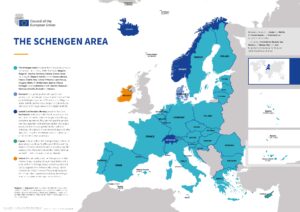
Source: Council of the European Union, General Secretariat of the Council, The Schengen area, Publications Office of the European Union, 2023, https://data.europa.eu/doi/10.2860/64700
Where Visas are being issued
Visas will be issued by all the Diplomatic Missions (Embassies and General Consulates) of the Republic of Cyprus, and by all the Honorary Consulates of the Republic of Cyprus abroad in their respective countries. Additionally, visas can also be issued by the British High Commissions / Embassies in the following countries:
ARGENTINE REPUBLIC, BAHREIN, HONG KONG, JAPAN, JORDAN, KAZAKHSTAN, KUWAIT, OMAN, SWITZERLAND, SUDAN, UNITED ARAB EMIRATES (ABU DHABI, DUBAI) and UZBEKISTAN.
For the latest consular information please visit the appropriate Section within the Ministry of Foreign Affairs website